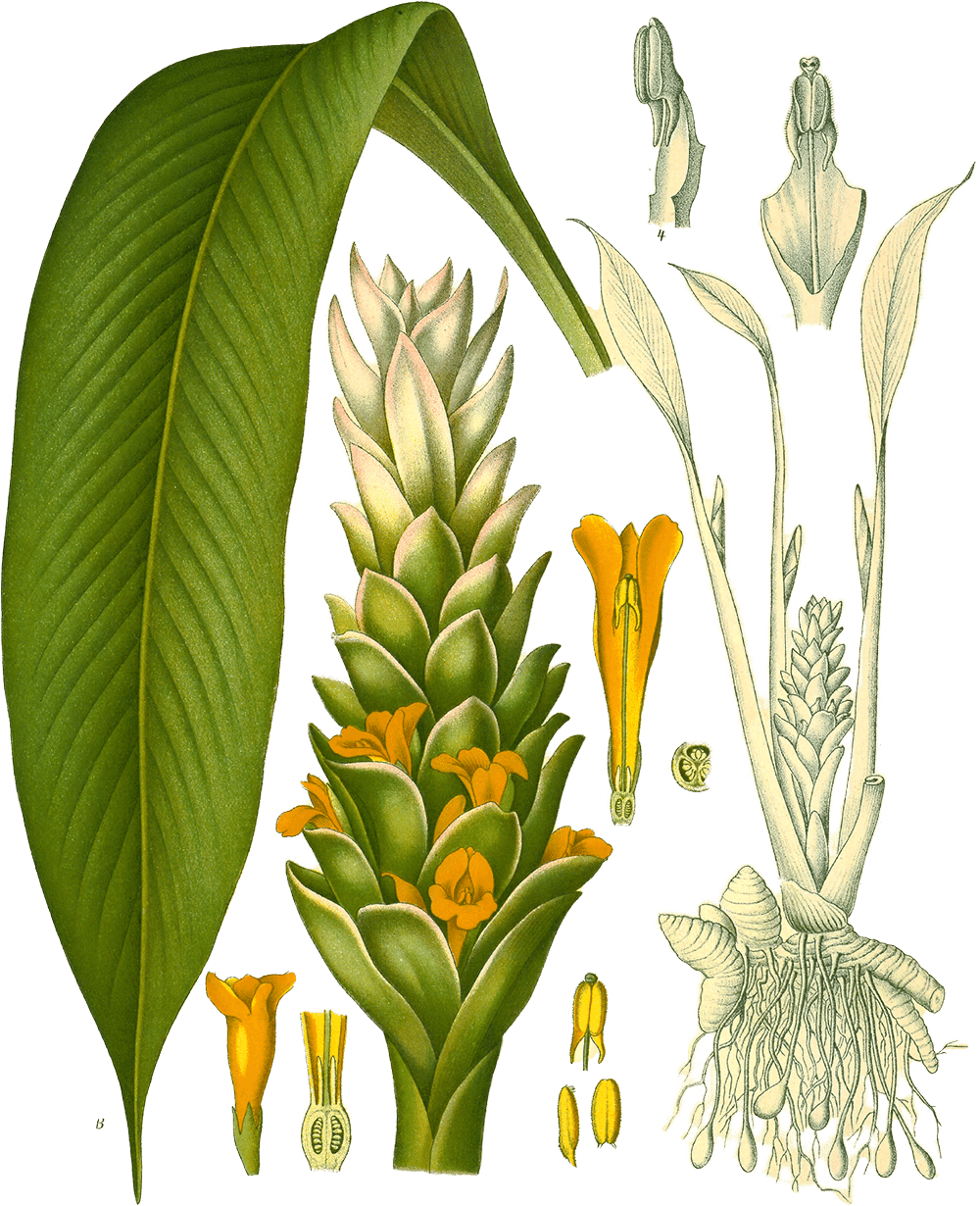Turmeric
The bright yellow powder yielded from the rhizomes of Curcuma longa, also known as turmeric.
English: turmeric · Hungarian: kurkuma · Arabic: كركم · Hindi: हल्दी · Chinese: 薑黃
Overview
| item | turmeric |
|---|---|
| taxon | Curcuma longa L. |
| family | Zingiberaceae |
| regions | Indian Subcontinent |
| continents | Asia-Tropical |
| part | rhizome |
| cultivation | China; Honduras; India; Indonesia; Jamaica |
| botanical_database | POWO; GBIF; TROP; EOL |
TURMERIC is a culinary, medicinal, and ritualistic spice, and dye, cultivated for its rhizome. It is yielded from the plant Curcuma longa L., a rhizomatous geophyte in the Zingiberaceae family, growing in seasonally dry tropical biome, with a native range of a cultigen from SW. India.1
It is used primarily in curries, dye; antiseptic. Its aroma is described as warm, acrid, bitter, with a heat index of 3.2
See more in ( Citation: POWO, 2024 POWO (2024). Plants of the world online. Facilitated by the Royal Botanic Gardens, Kew. Retrieved from http://www.plantsoftheworldonline.org/ ; Citation: Petruzzello, 2021 Petruzzello, M. (2021). List of herbs and spices. Retrieved from https://www.britannica.com/topic/list-of-herbs-and-spices-2024392 ; Citation: Wyk, 2014 Wyk, B. (2014). Culinary herbs and spices of the world. University of Chicago Press, joint publication with the Royal Botanic Gardens, Kew. ; Citation: Dalby, 2000 Dalby, A. (2000). Dangerous tastes: the story of spices. University of California Press. ; Citation: Hill, 2004 Hill, T. (2004). The contemporary encyclopedia of herbs and spices: Seasonings for the global kitchen. J. Wiley. ; Citation: Anderson, 2023 Anderson, I. (2023). The history and natural history of spices: the 5000-year search for flavour. The History Press. )
Illustration of Curcuma longa from Köhler’s Medizinal-Pflanzen ( Citation: 1887 Köhler, H. (1887). Köhler’s Medizinal-Pflanzen in naturgetreuen Abbildungen mit kurz erläuterndem Texte: Atlas zur Pharmacopoea germanica, austriaca, belgica, danica, helvetica, hungarica, rossica, suecica, Neerlandica, British pharmacopoeia, zum Codex medicamentarius, sowie zur Pharmacopoeia of the United States of America. Franz Eugen Köhler. Retrieved from https://www.biodiversitylibrary.org/bibliography/623 ) II 178.
Distribution
Native and introduced habitats of Curcuma longa3
Native areas: India
Introduced areas: Guinea-Bissau, Ivory Coast, Congo, Gulf of Guinea Is., Comoros, Mauritius, Réunion, China South-Central, China Southeast, Tibet, Taiwan, Assam, Bangladesh, East Himalaya, Sri Lanka, Andaman Is., Cambodia, Myanmar, Nicobar Is., Thailand, Vietnam, Borneo, Jawa, Lesser Sunda Is., Malaya, Philippines, Sumatera, New Guinea, Solomon Is., Queensland, Fiji, Gilbert Is., New Caledonia, Samoa, Tonga, Vanuatu, Cook Is., Easter Is., Marquesas, Pitcairn Is., Society Is., Tuamotu, Tubuai Is., Caroline Is., Hawaii, Belize, Costa Rica, Cuba, Dominican Republic, Haiti, Leeward Is., Puerto Rico, Trinidad-Tobago, Windward Is.
Bibliography
- Anderson (2023)
- Anderson, I. (2023). The history and natural history of spices: the 5000-year search for flavour. The History Press.
- Dalby (2000)
- Dalby, A. (2000). Dangerous tastes: the story of spices. University of California Press.
- Hill (2004)
- Hill, T. (2004). The contemporary encyclopedia of herbs and spices: Seasonings for the global kitchen. J. Wiley.
- Köhler (1887)
- Köhler, H. (1887). Köhler’s Medizinal-Pflanzen in naturgetreuen Abbildungen mit kurz erläuterndem Texte: Atlas zur Pharmacopoea germanica, austriaca, belgica, danica, helvetica, hungarica, rossica, suecica, Neerlandica, British pharmacopoeia, zum Codex medicamentarius, sowie zur Pharmacopoeia of the United States of America. Franz Eugen Köhler. Retrieved from https://www.biodiversitylibrary.org/bibliography/623
- Petruzzello (2021)
- Petruzzello, M. (2021). List of herbs and spices. Retrieved from https://www.britannica.com/topic/list-of-herbs-and-spices-2024392
- POWO (2024)
- POWO (2024). Plants of the world online. Facilitated by the Royal Botanic Gardens, Kew. Retrieved from http://www.plantsoftheworldonline.org/
- Wyk (2014)
- Wyk, B. (2014). Culinary herbs and spices of the world. University of Chicago Press, joint publication with the Royal Botanic Gardens, Kew.
Medicinal Spices Exhibit. (2002). UCLA Biomedical Library: History & Special Collections. https://unitproj.library.ucla.edu/biomed/spice/index.cfm?spicefilename=taste.txt&itemsuppress=yes&displayswitch=0 ↩︎
